The coming year will see big changes in the Instructional Technology Office, and leading up to it, students are receiving educational training to help educate them on the best safety practices to interact with new programs and technology. Among these are significant changes to the learning management system (LMS), Blackboard. Beginning with J-term classes, the “Ultra” interface will be incorporated in Blackboard, enhancing student and professor experiences and abilities.
The Ultra interface will include a new, sleek design and improved content layout. Maegan Cook, VWU’s instructional technologist, is responsible for implementing this change, as well as providing support for students and faculty. She foresees the new Ultra interface will help save time with a new design and simpler features.
“Users will notice a consolidated view of the most important information from all their courses in the new Activity Stream area,” Cook said. “Blackboard has improved its accessibility and mobile responsiveness providing people with a better user experience regardless of which type of device they are using.”
Cook aims to foster innovative learning and teaching on campus with the help of new technology and programs like this, while continuing to find efficient and user-friendly resources to incorporate in pre-existing programs.
Along with the updates to Blackboard, the IT department has been hard at work completing renovations to Clarke Hall, with upgrades including new computers, interactive projectors and a recording studio. Chief Information Officer Greg Skinner expects the new devices to arrive within the next few months so students can begin using these new features in upcoming semesters.
“I’m kind of bummed out that I had to change the way I walk because I do have a class in that hall, but I can’t wait to see what gets done in the building,” first year Kendra Gomez said.
To prepare for these new upgrades, students have been receiving emails with training videos to complete, instructing them on cyber safety practices to help ensure the safety of devices and information campus-wide.
Topics include device security, ransomware, tailgating and social engineering. From the beginning of the semester, students have been expected to complete one each month, but with October being recognized as National Cybersecurity Awareness Month, the department decided to send out weekly learning modules to emphasize the importance of this information.
“Our campus IT security relies on everyone being educated and committed to following safe computer security practices,” Skinner said. “Students make up the largest population of our VWU community. We are at our strongest when we are all working together for a common good.”
Information Security Officer and Network Manager Marcia Williams pointed out that the topics covered by these trainings were selected because of their relevance to everyday cybersecurity, noting that they “touch every aspect of our lives and that cyber criminals are still using [them] every day to exploit our weaknesses.”
Each training includes at least one video, while some include more and many include quizzes to be completed. Upon completion, students receive a certificate documenting this training. The videos portray scenarios with potential cybersecurity threats and explain what one should do when faced with these.
“While not all of the IT training sessions we have been asked to complete are totally pertinent to students, I think keeping up with basic cybersecurity training is necessary,” junior Debbie Buckalew said. “Technology is constantly changing and evolving, as are hackers and scammers, so it’s important to refresh what to do to protect ourselves and our information.”
However, not everyone shares this sentiment. While the information security trainings are intended to educate students and prepare them for potentially dangerous scenarios, some students see them as a nuisance. Students like Gomez have expressed anxiety over the consequences of not completing trainings and potentially receiving randomized testing on the training topics that they will be expected to pass.
“I feel that sometimes the trainings are annoying,” Gomez said. “I get wanting to educate students, but I feel like a lot of the topics are self-explanatory or common sense. On top of that, some of my friends and I are worried about getting in trouble for not being smart enough or not answering questions the way we’re expected to.”
Additionally, emails from the Malbon Center for Technology with the subject “Start your security awareness training” are being sent to students at 3 a.m. on weekdays to complete the tutorials.
System maintenance is another crucial part of these upgrades. Skinner explained that there have been no major outages with the wireless network, nor do they expect any in the future, so if students are experiencing significant issues, they should contact the Help Desk immediately.
By: Will Zimmerman-Farkas
scfarkas@vwu.edu



